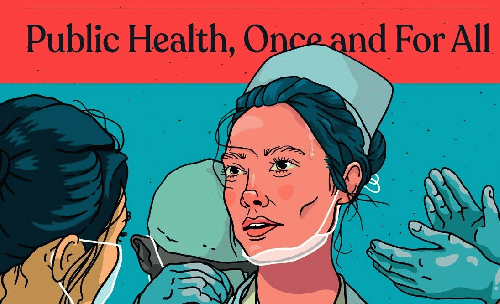
Profiteering from illness has to stop. Public health services are essential cog-in-the-wheel to sustainable development where no one is left behind
(Image by CNS) Details DMCA
The COVID-19 pandemic has illustrated, more than ever, the overwhelming importance of public services and the devastating consequences of under-funding and privatising them. That is why the writing on the wall on this year's United Nations Public Services Day is clear: commit to COVID-19 recovery plans that will deliver a new era of public services for all.
"COVID-19 has shown us that well-resourced public health systems are the best defense against any public health crisis. Similarly, the best defense against any economic crisis is well-resourced and functioning quality public services that are accessible to all, together with universal social protection. Yet, these services have been undermined over the last forty years" said Kate Lappin, Regional Secretary of Public Services International for Asia Pacific.
Countries that have invested in well-coordinated public services for quality education, reliable energy systems, accessible and well-maintained water and sanitation, will manage this pandemic, and any future crisis, far better than those who have embraced the corrosive ideology of neoliberalism. "But, in this crisis there is an opportunity for us to make changes in the global financial and economic rules to ensure that the COVID-19 recovery is such that it can weather any future crisis" remarked Kate Lappin.
Rosa Pavanelli, General Secretary Public Services International, rightly pointed out that we are witnessing the results of failure of the existing economic system in controlling the current pandemic. Years of reducing funding and staffing in public health systems has resulted in poor primary healthcare services, understaffed health services, and absence of job safety policies that could allow workers to receive personal protection they need in times of crisis like COVID-19. The push to encourage private sector has not only undermined delivery of quality services, but also undermined the capacity to ensure universal access to health services during COVID-19, she said.
finance gender responsive public services
David Archer, Head of Public Services, ActionAid International, is one of the two authors of the report, "Who Cares for the Future: finance gender responsive public services!". While sharing data from this report, Archer underlined three factors that have impacted government spending on public services which has undermined countries' efforts to address the COVID-19 crisis.
rising debt
According to Archer, "There is a new debt crisis and a major sufferer is the governments' capacity to spend on public services. We looked at 60 countries and found that 30 of them were spending more than 12% of their national budgets on servicing debt. These 30 countries had also cut on spending of public services during the last three years. Where debt servicing has risen it has led to under investment in health, education and other public services. Those countries that managed to keep their debt servicing below 12% were increasing their spending on public services. This debt crisis had not been recognised prior to COVID-19. There have now been some small efforts to temporarily suspend debt payments to allow governments to spend revenue on providing a comprehensive response to COVID-19. But it is not enough. There needs to be a much longer- term suspension, rather cancellation, of debt and renegotiation to ensure that in future all debts are negotiated at country level in a transparent and accountable manner and that debt servicing does not rise above 12% of the national budgets" he said.
public sector wages
(Note: You can view every article as one long page if you sign up as an Advocate Member, or higher).





